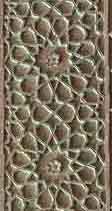REQUIRED WORK:
*Barbara D. and Thomas
R. Metcalf, "Civil Society, Colonial Constraints, 1885-1919," A
Concise History of India, Chapter 5, pp. 123-164.
*David Lelyveld, "Growing
Up Sharif," pp. 35-56 (Part One of Chapter Two, "Sharif Culture and
British Rule"), Aligarh's First Generation: Muslim Solidarity in British
India (Princeton: Princeton University Press, 1978):
on
the CU website.
*Shaista Suhrawardy Ikramullah,
Chapters One and Two of From Purdah to Parliament (Karachi: Oxford
University Press, 1998): on
the CU website.
*Altaf Husain Hali, "On
the Founding of Aligarh M.A.O. College," from
Hayat-i-Javed; A Biography
of Sir Sayyid, trans. by David J. Mathews (New Delhi: Rupa and Co,
1994), pp. 220-248. BUTLER RESERVE. Also: this
passage on the CU website.
*Sir Sayyid Ahmad Khan,
"Syed
Ahmed Khan's Speech at Lucknow, 28 September 1887": on
the CU website.
*Sir Sayyid Ahmad Khan,
"Syed
Ahmed Khan's Speech at Meerut, 16 March 1888": on
the CU website.
*Rev. John F. Hurst,
"A
Native Publishing House in India," in Harper's New Monthly
Magazine 75 (June-Nov 1887), pp. 352-356:
at
the Cornell Univ. Library site. (Note that you can enlarge the type
if you wish.)
POSSIBLE
PAPER TOPIC NINE:
Consider the biography of Sir Sayyid
called Hayat-i-Javed ("An Immortal Life"). It is a literary work
by a notable reformist, writer, and friend of Sir Sayyid's, Altaf Husain
"Hali" (1837-1914). ("Hali," his pen-name, means "Modern.") Do you think
Hali is promoting any special agenda of his own? Does his treatment of
Sir Sayyid's life amount to mere hero-worship and hagiography, or do you
see more thoughtful and analytical strands in it? For what, if anything,
does he criticize Sir Sayyid? Source: Altaf Husain Hali,
Hayat-i-Javed;
A Biography of Sir Sayyid, trans. by David J. Mathews (New Delhi: Rupa
and Co, 1994).



